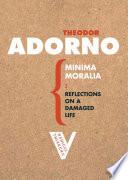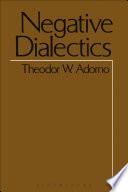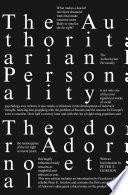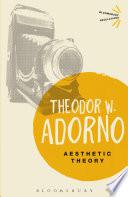Works

Minima Moralia
Theodor W. Adorno
Negative Dialectics
Theodor W. Adorno
The Authoritarian Personality
Theodor W. Adorno
Aesthetic Theory
Theodor W. AdornoFamous Theodor W. Adorno Quotes
Source: On the Fetish Character in Music and the Regression of Listening (1938), p. 273
Theodor W. Adorno Quotes about the world
Source: Wozu noch Philosophie? [Why still philosophy?] (1963), p. 10
“The darkening of the world makes the irrationality of art rational: radically darkened art.”
Source: Aesthetic Theory
E. Jephcott, trans. (1974), § 10
Minima Moralia (1951)
Source: Wozu noch Philosophie? [Why still philosophy?] (1963), p. 12
Philosophy of Modern Music (1973) as translated by Anne G. Mitchell and Wesley V. Blomster
Theodor W. Adorno Quotes about thinking
Source: Wozu noch Philosophie? [Why still philosophy?] (1963), p. 9
Denken, das offen, konsequent und auf dem Stand vorwärtsgetriebener Erkenntnis den Objekten sich zuwendet, ist diesen gegenüber frei auch derart, daß es sich nicht vom organisierten Wissen Regeln vorschreiben läßt. Es kehrt den Inbegriff der in ihm akkumulierten Erfahrung den Gegenständen zu, zerreißt das gesel1schaftliche Gespinst, das sie verbirgt, und gewahrt sie neu.
Source: Wozu noch Philosophie? [Why still philosophy?] (1963), p. 13
Source: Lectures on Negative Dialectics (1965-66), p. 45
Der des Jargons Kundige braucht nicht zu sagen, was er denkt, nicht einmal recht es zu denken: das nimmt der Jargon ihm ab und entwertet den Gedanken.
Source: Jargon der Eigentlichkeit [Jargon of Authenticity] (1964), p. 9
Theodor W. Adorno: Trending quotes
Immer von Beckett ist eine technische Reduktion bis zum äußersten. … Aber diese Reduktion ist ja wirklich das was die Welt aus uns macht … das heißt die Welt aus uns gemacht diese Stümpfe von Menschen also diese Menschen die eigentlich ihr ich ihr verloren haben die sind wirklich die Produkte der Welt in der wir leben.
"Beckett and the Deformed Subject" (Lecture)
Die Glorifizierung der prächtigen underdogs läuft auf die des prächtigen Systems heraus, das sie dazu macht.
E. Jephcott, trans. (1974), § 7
Minima Moralia (1951)
Their applause, cued in by a light-signal, is transmitted directly on the popular radio programmes they are permitted to attend. They call themselves 'jitter-bugs', bugs which carry out reflex movements, performers of their own ecstasy. Merely to be carried away by anything at all, to have something of their own, compensates for their impoverished and barren existence. The gesture of adolescence, which raves for this or that on one day with the ever-present possibility of damning it as idiocy on the next, is now socialized.
Perennial fashion — Jazz, as quoted in The Sociology of Rock (1978) by Simon Frith, ISBN 0094602204
Theodor W. Adorno Quotes
Section 10
Culture Industry Reconsidered (1963)
Context: The phrase, the world wants to be deceived, has become truer than had ever been intended. People are not only, as the saying goes, falling for the swindle; if it guarantees them even the most fleeting gratification they desire a deception which is nonetheless transparent to them. They force their eyes shut and voice approval, in a kind of self-loathing, for what is meted out to them, knowing fully the purpose for which it is manufactured. Without admitting it they sense that their lives would be completely intolerable as soon as they no longer clung to satisfactions which are none at all.
“There is no right life in the wrong one.”
Source: Minima Moralia: Reflections from a Damaged Life
Source: On the Fetish Character in Music and the Regression of Listening (1938), p. 290
E. Jephcott, trans. (1974), § 1
Minima Moralia (1951)
Context: The son of well-to-do parents who … engages in a so-called intellectual profession, as an artist or a scholar, will have a particularly difficult time with those bearing the distasteful title of colleagues. It is not merely that his independence is envied, the seriousness of his intentions mistrusted, that he is suspected of being a secret envoy of the established powers. … The real resistance lies elsewhere. The occupation with things of the mind has by now itself become “practical,” a business with strict division of labor, departments and restricted entry. The man of independent means who chooses it out of repugnance for the ignominy of earning money will not be disposed to acknowledge the fact. For this he is punished. He … is ranked in the competitive hierarchy as a dilettante no matter how well he knows his subject, and must, if he wants to make a career, show himself even more resolutely blinkered than the most inveterate specialist. The urge to suspend the division of labor which, within certain limits, his economic situation enables him to satisfy, is thought particularly disreputable: it betrays a disinclination to sanction the operations imposed by society, and domineering competence permits no such idiosyncrasies. The departmentalization of mind is a means of abolishing mind where it is not exercised ex officio, under contract. It performs this task all the more reliably since anyone who repudiates this division of labor—if only by taking pleasure in his work—makes himself vulnerable by its standards, in ways inseparable from elements of his superiority. Thus is order ensured: some have to play the game because they cannot otherwise live, and those who could live otherwise are kept out because they do not want to play the game.
Section 14
Culture Industry Reconsidered (1963)
Context: The power of the culture industry's ideology is such that conformity has replaced consciousness. The order that springs from it is never confronted with what it claims to be or with the real interests of human beings. Order, however, is not good in itself. It would be so only as a good order. The fact that the culture industry is oblivious to this and extols order in abstracto, bears witness to the impotence and untruth of the messages it conveys. While it claims to lead the perplexed, it deludes them with false conflicts which they are to exchange for their own. It solves conflicts for them only in appearance, in a way that they can hardly be solved in their real lives.
“Art is magic delivered from the lie of being truth.”
Kunst ist Magie, befreit von der Lüge, Wahrheit zu sein.
E. Jephcott, trans. (1974), § 143
Minima Moralia (1951)
Source: Wozu noch Philosophie? [Why still philosophy?] (1963), p. 6
Source: Lectures on Negative Dialectics (1965-66), p. 23
Furchtbares hat die Menschheit sich antun müssen, bis das Selbst, der identische, zweckgerichtete, männliche Charakter des Menschen geschaffen war, und etwas davon wird noch in jeder Kindheit wiederholt.
E. Jephcott, trans., p. 26
Dialektik der Aufklärung [Dialectic of Enlightenment] (1944)
“The straight line is regarded as the shortest distance between two people, as if they were points.”
Nun gilt für die kürzeste Verbindung zwischen zwei Personen die Gerade, so als ob sie Punkte wären.
E. Jephcott, trans. (1974), § 20
Minima Moralia (1951)
Section 14
Culture Industry Reconsidered (1963)
Die fast unlösbare Aufgabe besteht darin, weder von der Macht der anderen, noch von der eigenen Ohnmacht sich dumm machen zu lassen.
E. Jephcott, trans. (1974), § 34
Minima Moralia (1951)
Source: Lectures on Negative Dialectics (1965-66), p. 18
Sie möchte formal und material ebenjener Gestalt geistiger Freiheit helfen, die in den herrschenden philosophischen Richtungen keine Stel1e hat.
Source: Wozu noch Philosophie? [Why still philosophy?] (1963), p. 13
Source: Lectures on Negative Dialectics (1965-66), p. 20
Die Berufung auf Wissenschaft, auf ihre Spielregeln, auf die Alleingültigkeit der Methoden, zu denen sie sich entwickelte, ist zur Kontrollinstanz geworden, die den freien, ungegängelten, nicht schon dressierten Gedanken ahndet und vom Geist nichts duldet als das methodologisch Approbierte. Wissenscahaft,das Medium von Autonomie, ist in einen Apparat der Heteronomie ausgeartet.
Source: Wozu noch Philosophie? [Why still philosophy?] (1963), p. 12
“Was bedeutet Aufarbeitung der Vergangenheit” (1959)
Source: On the Fetish Character in Music and the Regression of Listening (1938), p. 279
Negative Dialektik ... handelt sich um den Entwurf einer Philosophie, die nicht den Begriff der Identität von Sein und Denken voraussetzt und auch nicht in ihm terminiert, sondern die gerade das Gegenteil, also das Auseinanderweisen von Begriff und Sache, von Subjekt und Objekt, und ihre Unversöhntheit, artikulieren will.
Source: Lectures on Negative Dialectics (1965-66), p. 6
“The dressing up and puffing up of the individual erases the lineaments of protest.”
Source: On the Fetish Character in Music and the Regression of Listening (1938), p. 283
Source: Wozu noch Philosophie? [Why still philosophy?] (1963), p. 6
Source: Lectures on Negative Dialectics (1965-66), p. 169
Perennial fashion — Jazz, as quoted in The Sociology of Rock (1978) by Simon Frith
The Authoritarian Personality (1950), p. 976, co-written with Else Frenkel-Brunswik, Daniel Levinson, and Nevitt Sanford
Perennial fashion — Jazz, as quoted in The Sociology of Rock (1978) by Simon Frith,
“Words of the jargon sound as if they said something higher than what they mean.”
Source: Jargon der Eigentlichkeit [Jargon of Authenticity] (1964), p. 9
Source: Lectures on Negative Dialectics (1965-66), p. 16
"Perennial Fashion — Jazz" (1978), Prisms, p. 129, as translated by Samuel Weber and Shierry Weber (1981)
Falsch am Positivismus ist, daß er die nun einmal gegebene Arbeitsteilung, die der Wissenschaften von der gesellschaftlichen Praxis und die innerhalb der Wissenschaft, als Maß des Wahren supponiert und keine Theorie erlaubt, welche die Arbeitsteilung selbst als abgeleitet, vermittelt durchsichtig machen, ihrer falschen Autorität entkleiden könnte.
Source: Wozu noch Philosophie? [Why still philosophy?] (1963), p. 10
as quoted in The Origin of Negative Dialectics (Free Press: 1977), p. 187
Source: Lectures on Negative Dialectics (1965-66), p. 18
Was Jargon sei und was nicht, darüber entscheidet, ob das Wort in dem Tonfall geschrieben ist, in dem es sich als transzendent gegenüber der eigenen Bedeutung setzt; ob die einzelnen Worte aufgeladen werden auf Kosten von Satz, Urteil, Gedachtem. Demnach wäre der Charakter des Jargons überaus formal: er sorgt dafür, daß, was er möchte, in weitem Maß ohne Rücksicht auf den Inhalt der Worte gespürt und akzeptiert wird durch ihren Vortrag.
Source: Jargon der Eigentlichkeit [Jargon of Authenticity] (1964), p. 8
Source: On the Fetish Character in Music and the Regression of Listening (1938), p. 290
Wer will es schließlich selbst den allerfreiesten Geistern verübeln, wenn sie nicht mehr für eine imaginäre Nachwelt schreiben, deren Zutraulichkeit die der Zeitgenossen womöglich noch überbietet, sondern einzig für den toten Gott?
E. Jephcott, trans. (1974), § 133
Minima Moralia (1951)
Source: Lectures on Negative Dialectics (1965-66), p. 18
“Writing poetry after Auschwitz is barbaric.”
[N]ach Auschwitz ein Gedicht zu schreiben, ist barbarisch...
Full quote: Kulturkritik findet sich der letzten Stufe der Dialektik von Kultur und Barbarei gegenüber: nach Auschwitz ein Gedicht zu schreiben, ist barbarisch, und das frißt auch die Erkenntnis an, die ausspricht, warum es unmöglich ward, heute Gedichte zu schreiben.
Kulturkritik und Gesellschaft [Cultural Criticism and Society] (1951); this quote is more famously known in the forms "No poetry after Auschwitz" or "There can be no poetry after Auschwitz." Sometimes a more specific proscription is made, such as "No lyric poetry after Auschwitz." The influence of the underlying idea can be seen in such derivative statements as "No history after Auschwitz."
“Philosophy … must not bargain away anything of the emphatic concept of truth.”
Source: Wozu noch Philosophie? [Why still philosophy?] (1963), p. 7
Source: On the Fetish Character in Music and the Regression of Listening (1938), p. 271
Source: Wozu noch Philosophie? [Why still philosophy?] (1963), p. 7
Source: Wozu noch Philosophie? [Why still philosophy?] (1963), p. 6
Source: Jargon der Eigentlichkeit [Jargon of Authenticity] (1964), p. 9
“Wrong life cannot be lived rightly.”
Es gibt kein richtiges Leben im falschen.
E. Jephcott, trans. (1974), § 18
Minima Moralia (1951)
Source: On the Fetish Character in Music and the Regression of Listening (1938), p. 296
